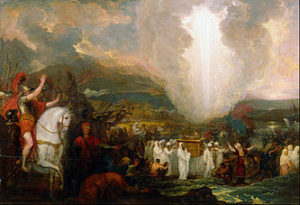The Lord be with you
Concordia Theological Quarterly is a peer reviewed journal that I receive. In the January/April 2015 issue (Volume 79; Number 1-2) is an article by Walter A. Maier III titled The Divine Presence within the Cloud (pages 79-102). This post is a review of that article. A link to the article is found at the end of this post.
A Theophany is an appearance of God to people but the presence of God is veiled in some fashion to protect the people. To put that another way, theophanies both reveal and conceal God. They are, then, marks of God’s great mercy in at least two ways. First, God appears to someone. Second, God ensures that that person is not harmed by the appearance. All theophanies may also be considered foreshadows of the Incarnation for in Jesus God indeed dwelled among us in a visible way, but the divinity was veiled so that being in the presence of Jesus caused no harm. There are numerous theophanies in the Bible, such as the burning bush in Exodus 3 or the appearance of the “Divine Angel” to Abraham in Genesis 18.
 This article by Maier deals specifically with ones in which God’s presence is manifest with/in cloud/s. Maier examines five different cloud theophanies. First is the pillar of cloud that accompanied Israel during the Exodus. Second is the cloud of Mount Sinai when the Law was given. Third is the cloud over the Ark of the Covenant. Fourth is the cloud that appeared at the Transfiguration of Christ. The fifth is the cloud(s) of Judgment Day. To do this he examines over forty Bible passages, not counting references in the footnotes.
This article by Maier deals specifically with ones in which God’s presence is manifest with/in cloud/s. Maier examines five different cloud theophanies. First is the pillar of cloud that accompanied Israel during the Exodus. Second is the cloud of Mount Sinai when the Law was given. Third is the cloud over the Ark of the Covenant. Fourth is the cloud that appeared at the Transfiguration of Christ. The fifth is the cloud(s) of Judgment Day. To do this he examines over forty Bible passages, not counting references in the footnotes.
From these various cloud theophanies Maier finds, aside from the standard Theophany deductions found above, that they “conveyed the reality of the immanence and transcendence of God, that is, his nearness to, and distance from, the Israelites.” He also writes, “The pillar of cloud, the mountain cloud, and the atonement-cover cloud reminded the Israelites that God could be at different locations at the same time. They could speak of Yahweh’s presence being localized but also confess that Yahweh was omnipresent.” He also finds that the Sinai event foreshadowed both the Transfiguration of Christ and his Second Coming.
He concludes, “We see, then, a fundamental relationship among the clouds examined in this study; the pillar of cloud, the Sinai cloud, the atonement-cover cloud, the transfiguration cloud, and the cloud(s) of Christ’s second advent. Within each was, or will be, the divine presence. That was a blessed reality for the Israelites and for the apostles, and it will be for us on the Last Day.”
This article would be an excellent source for a Bible study on this topic. As is common in the articles for Concordia Theological Quarterly, Maier is actually writing for pastors, seminary professors, and like professionals. Therefore he refers to the Hebrew and Greek texts, considers certain textual questions as they impact the passages examined, and so forth. If you are not familiar with such things, one point to keep in mind that will make the reading of the article easier is the abbreviation “ET.” ET stands for English Text. There are times when the breakdown of chapters and verses in the Masoretic Text (Hebrew text) and the English Text, as found in a standard English Bible, are not the same. When this happens, the letters “ET” tell you where to find the reference in your English Bibles.
THE DIVINE PRESENCE WITHIN THE CLOUD
Blessings in Christ,
Pastor Rickert
